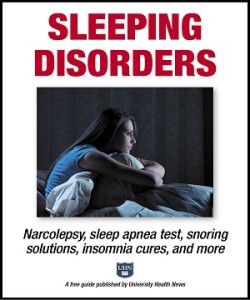Why Am I Having Hypnagogic Hallucinations?
Do you ever have wild visions or dreams that are extremely vivid and seem like real life just as you’re falling asleep? You may be experiencing hypnagogic hallucinations, a condition often associated with narcolepsy. In fact, hypnagogic hallucinations are among the four most common narcolepsy symptoms, along with sleep paralysis, daytime sleepiness, and cataplexy—a sudden loss of muscle tone and control while awake.
But hypnagogic hallucinations aren’t always signs of narcolepsy. Sometimes, antidepressant medications can trigger vivid bedtime dreams. For some people, hypnagogic hallucinations are the result of stress, anxiety, or insomnia.
“So Strange and So Real”
Hypnagogic refers to the transition between being wakefulness and sleep. It’s that drowsy feeling you have just as you’re falling asleep. You may be somewhat aware of your surroundings during this period. You may even have mild dream-like thoughts. But hypnagogic hallucinations are much different. They tend to seem very “lifelike” and have a strong sensory component. You’ll see, hear and feel things as though you were fully awake.
When you awake from a typical dream, you usually know that you were dreaming. And even if you had a disturbing dream or nightmare, you can chalk it up to a bad dream and get on with your day.
But if you have hypnagogic hallucinations, you may have a harder time separating them from reality. Because they’re often so strange and seem so real, they can leave you feeling afraid and confused because the contents of the hallucinations made no sense.
Sleep Better Tonight!
Get a FREE Special Report from the editors of University Health News, Sleeping Disorders: Narcolepsy, sleep apnea test, snoring solutions, insomnia cures, and more.
You’ll read about habits and conditions that rob us of peaceful slumber.
About one out of four people experience hypnagogic hallucinations at some point. This is in contrast to hallucinations that occur while a person is fully awake. Only about 5 percent of the population ever experiences waking hallucinations.
Hypnagogic hallucinations are rare in children, but they can surface in adolescence and into young adulthood. This is also the time when narcolepsy tends to first show up. Hypnagogic hallucinations are most common among individuals with narcolepsy.
Narcolepsy and Other Causes
The causes of narcolepsy aren’t well understood. The most well-known narcolepsy symptoms include sudden, unexpected naps of a few seconds or much longer. But hypnagogic hallucinations and sleep paralysis are also trademark signs of the condition. Sleep paralysis sometimes accompanies hypnagogic hallucinations, and it is characterized by an inability to move or speak as you fall asleep. These two narcolepsy symptoms can be the two most upsetting because they make you feel especially vulnerable and powerless.
If you have no other narcolepsy symptoms, the cause of your hypnagogic hallucinations may be due to stress, insomnia, or drug or alcohol use. Tricyclic antidepressants have been associated with hypnagogic hallucinations, but these medications have been replaced to a great extent by other drugs, such as selective serotonin reuptake inhibitors (SSRIs).
But illicit drugs and excessive alcohol consumption can produce hallucinations. If you or a loved one appear to have a problem with drugs or alcohol, seek help from your physician or a treatment program in your community. The health risks to you and those around you include much more than vivid and disturbing dreams.
If stress or anxiety may be at the root of your hypnagogic hallucinations, you should also consult with your doctor or a mental health professional. Techniques in stress relief and therapy to help you cope with anxiety may be able to put an end to bedtime hallucinations and other symptoms.
Outlook
If hypnagogic hallucinations occur infrequently and don’t disturb your sleep, no treatment may be necessary. But if they’re a cause of great stress or occur on a regular basis, then by all means seek help.
But understand that hypnagogic hallucinations are not signs of mental illness. It is this fear or misunderstanding that keeps some people from discussing such episodes. If your doctor doesn’t seem knowledgeable or equipped to deal with your concerns, seek out a sleep specialist. You may be advised to avoid bed until you become very sleepy. Sometimes lying awake and worrying about possible hallucinations can make the situation worse.
These hallucinations are common, and with treatment for underlying causes, they may disappear on their own. In addition, while hypnagogic hallucinations tend to develop first in young people, as you age, however, your chances of experiencing these visions declines.
Originally published May 2016.
The post Why Am I Having Hypnagogic Hallucinations? appeared first on University Health News.
Read Original Article: Why Am I Having Hypnagogic Hallucinations? »
Powered by WPeMatico


